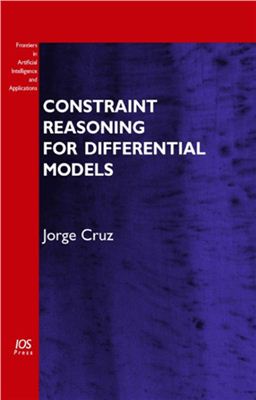IOS Press, 2005. - 243 pages.
The basic motivation of this work was the integration of biophysical models within the interval constraints framework for decision support. Comparing the major features of biophysical models with the expressive power of the existing interval constraints framework, it was clear that the most important inadequacy was related with the representation of differential equations. System dynamics is often modelled through differential equations but there was no way of expressing a differential equation as a constraint and integrate it within the constraints framework.
Consequently, the goal of this work is focussed on the integration of ordinary differential equations within the interval constraints framework, which for this purpose is extended with the new formalism of Constraint Satisfaction Differential Problems. Such framework allows the specification of ordinary differential equations, together with related information, by means of constraints, and provides efficient propagation techniques for pruning the domains of their variables. This enabled the integration of all such information in a single constraint whose variables may subsequently be used in other constraints of the model. The specific method used for pruning its variable domains can then be combined with the pruning methods associated with the other constraints in an overall propagation algorithm for reducing the bounds of all model variables.
The application of the constraint propagation algorithm for pruning the variable domains, that is, the enforcement of local-consistency, tued out to be insufficient to support decision in practical problems that include differential equations. The domain pruning achieved is not, in general, sufficient to allow safe decisions and the main reason derives from the non-linearity of the differential equations. Consequently, a complementary goal of this work proposes a new strong consistency criterion, Global Hull-consistency, particularly suited to decision support with differential models, by presenting an adequate trade-of between domain pruning and computational effort. Several alteative algorithms are proposed for enforcing Global Hull-consistency and, due to their complexity, an effort was made to provide implementations able to supply any-time pruning results.
The basic motivation of this work was the integration of biophysical models within the interval constraints framework for decision support. Comparing the major features of biophysical models with the expressive power of the existing interval constraints framework, it was clear that the most important inadequacy was related with the representation of differential equations. System dynamics is often modelled through differential equations but there was no way of expressing a differential equation as a constraint and integrate it within the constraints framework.
Consequently, the goal of this work is focussed on the integration of ordinary differential equations within the interval constraints framework, which for this purpose is extended with the new formalism of Constraint Satisfaction Differential Problems. Such framework allows the specification of ordinary differential equations, together with related information, by means of constraints, and provides efficient propagation techniques for pruning the domains of their variables. This enabled the integration of all such information in a single constraint whose variables may subsequently be used in other constraints of the model. The specific method used for pruning its variable domains can then be combined with the pruning methods associated with the other constraints in an overall propagation algorithm for reducing the bounds of all model variables.
The application of the constraint propagation algorithm for pruning the variable domains, that is, the enforcement of local-consistency, tued out to be insufficient to support decision in practical problems that include differential equations. The domain pruning achieved is not, in general, sufficient to allow safe decisions and the main reason derives from the non-linearity of the differential equations. Consequently, a complementary goal of this work proposes a new strong consistency criterion, Global Hull-consistency, particularly suited to decision support with differential models, by presenting an adequate trade-of between domain pruning and computational effort. Several alteative algorithms are proposed for enforcing Global Hull-consistency and, due to their complexity, an effort was made to provide implementations able to supply any-time pruning results.

